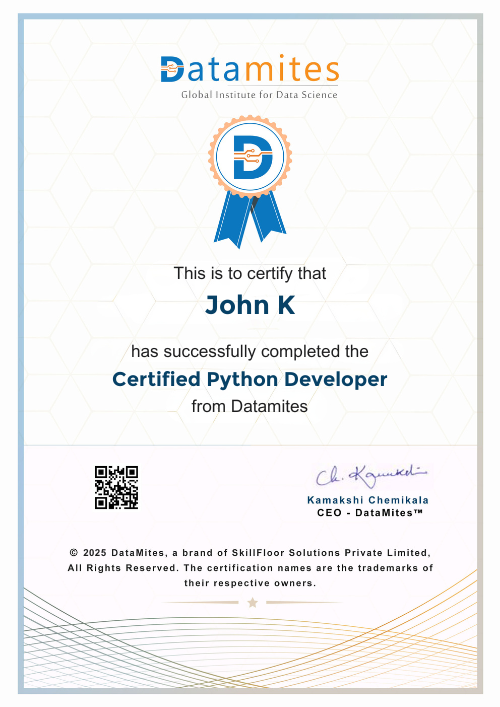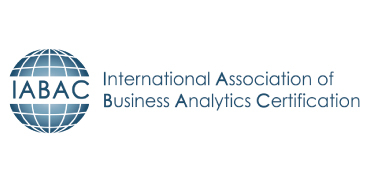Instructor Led Live Online
Self Learning + Live Mentoring
Customize Your Training

• Introduction of python
• Installation of Python and IDE
• Python Variables
• Python basic data types
• Number & Booleans, strings
• Arithmetic Operators
• Comparison Operators
• Assignment Operators
• IF Conditional statement
• IF-ELSE
• NESTED IF
• Python Loops basics
• WHILE Statement
• FOR statements
• BREAK and CONTINUE statements
• Basic data structure in python
• Basics of List
• List: Object, methods
• Tuple: Object, methods
• Sets: Object, methods
• Dictionary: Object, methods
• Functions basics
• Function Parameter passing
• Lambda functions
• Map, reduce, filter functions
• Decorators
• Generators
• Context Managers
• Metaclasses
• Inheritance and Polymorphism
• Encapsulation and Abstraction
• Class methods and static methods
• Special (magic/dunder) methods
• Property decorators - getters, setters, and deletes
• Working with files
• Reading and writing files
• Buffered read and write
• Other file methods
• Logging & Debugger
• Modules and import statements
• SQL Basics
• Creating DB Table
• INSERT, READ, UPDATE, DELETE
• Introduction to MongoDB
• CRUD operations in MongoDB
• namedtuple(), deque, ChainMap,
• Counter, OrderedDict, defaultdict,
• UserDict, UserList, UserString
• Exceptions handling with try-except
• Custom exception handling
• List of general use exception
• Best practice exception handling
• Generators, Iterators
• The Functions any and all
• With Statement
• Data Compression
• A Daytime Server
• Clients and Servers
• The Client and Server Programs
• Classes and Threads
• Multi-threading; thread life cycle
• Regular Expression Syntax
• Group, Split and wildcards
• Quantifiers
• Match, Search and Find all methods
• Character Sequence
• Introduction to OpenCV, Installation
• Basic Operations on Images
• Image Filtering
• Image Classification
• Introduction to GIT
• Basic Git commands
• Introduction to Flask and Installation
• Creating project
• Routing,templates, forms and database integration
• Deployment on render
• Django Introduction and Installation
• Creating a Project
• Django Architecture and File Structure
• Folder Structure, First Django project
• Database and Views, Static Files and Forms
• URL Mapping and Routing
• Defining Models and Relationships
• Database Migrations and Schema Changes
• Querying Data using Django ORM
• Model Forms and Form Validation
• HTML Forms in Django
• Model Forms and Form Validation
• Formsets and Inline Formsets
• File Uploads and Validation
• Deploying Django Applications
• Hosting Options (e.g., Heroku, AWS)
• Project Showcasing and Review
Python distinguishes itself as a dynamic, high-level language renowned for its versatility and adaptability across various domains.
Implementing Python on a computer system involves procuring the installer from the official Python website and adhering to the installation instructions provided.
Preference between Python and Java fluctuates depending on the context; Python earns accolades for its simplicity and learnability, while Java excels in performance and scalability within enterprise environments.
Python 2 has reached its end of life, ceasing development and support, while Python 3 continues to evolve, introducing syntax enhancements and new functionalities.
Novices can effectively acquaint themselves with Python through avenues such as online tutorials, interactive coding platforms, literature resources, and active participation in coding communities.
Python emerges as an indispensable tool in data science endeavors, leveraging libraries like Pandas, NumPy, and scikit-learn to facilitate tasks ranging from data manipulation to machine learning.
Python frameworks furnish developers with pre-existing code and libraries to streamline development efforts within specific domains, be it web development (e.g., Django, Flask) or GUI applications (e.g., Tkinter).
Proficient debugging of Python code involves employing techniques such as strategic print statements, utilizing debugging tools like PDB or IDE debuggers, and meticulously analyzing error messages.
Python exhibits greater versatility, catering to a broader array of applications, whereas R specializes in statistical analysis, boasting richer packages tailored explicitly for such tasks.
In Dublin, the demand for Python developers has witnessed a steady ascent, propelled by Python's prevalence in web development, data science, and automation domains.
Employers often seek Python developers who possess a solid grasp of fundamental Python concepts, adept problem-solving skills, familiarity with various frameworks and libraries, and the ability to write efficient, maintainable code.
While Python certifications can serve as a validation of skills, employers often prioritize practical experience and demonstrable projects over certifications.
Crafting an impactful resume involves showcasing relevant Python projects, highlighting problem-solving abilities, and emphasizing specific technical skills and accomplishments that align with the role.
Effective preparation for Python developer interviews entails revisiting algorithms, practising coding challenges, and demonstrating a comprehensive understanding of Python principles and best practices.
While a formal degree can be beneficial, practical skills and real-world experience often carry more weight in the Python development field, making academic qualifications optional for many roles.
The primary responsibilities of a Python developer include developing applications, implementing algorithms, troubleshooting issues, and collaborating with team members to achieve project objectives.
Transitioning into a Python developer role involves acquiring relevant skills through online courses, bootcamps, or self-directed study, building a portfolio of projects, and networking within the industry to explore opportunities.
Python is extensively used in data science for tasks such as data manipulation, analysis, visualization, machine learning, and statistical modeling, owing to its versatile libraries and tools.
Python plays a crucial role in artificial intelligence applications, including natural language processing, computer vision, machine learning algorithms, and the development of neural networks, due to its simplicity and powerful libraries.
Major corporations such as Google, Facebook, Amazon, and Netflix extensively utilize Python across various facets of their operations, including web development, data analysis, automation, and machine learning initiatives.
According to a report from Indeed, Python developers in Dublin can anticipate an annual salary ranging around EUR 79,359, reflecting the competitive compensation within the industry.
DataMites stands as a top choice for Python training in Dublin, offering a robust curriculum, seasoned instructors, and adaptable teaching methodologies. Whether you're a novice or seeking to advance your Python skills, DataMites provides practical learning experiences through hands-on projects and dedicated placement assistance to bolster your career prospects.
Opting for Python training with DataMites in Dublin ensures immersion in a program meticulously crafted to excel in a dynamic programming landscape, aligning closely with industry demands. The emphasis on hands-on learning guarantees acquisition of relevant skills essential for success in the field.
The Python developer course at DataMites in Dublin spans four months, comprising 20 hours of live online sessions complemented by 400 hours of self-paced learning opportunities.
DataMites welcomes individuals from diverse educational backgrounds, including graduates, postgraduates, and high school graduates, to enroll in the Python developer training in Dublin. The program is designed to accommodate beginners, focusing on establishing a strong foundation in Python fundamentals.
DataMites offers a Flexi-Pass feature for Python training, granting participants a flexible three-month window to access training sessions. This flexibility allows learners to address queries, review material, and attend additional sessions as needed to meet their learning objectives effectively.
The DataMites Certified Python Developer course delivers comprehensive training encompassing fundamental to advanced Python concepts, empowering participants with proficient Python skills tailored to meet industry standards.
The Python for Data Science course caters to individuals with varying levels of programming proficiency, covering essential concepts such as data manipulation, machine learning algorithms, and programming techniques indispensable for data analysis, regardless of prior experience.
The Data Mining with Python course delves into techniques for extracting insights from extensive datasets to drive predictive analytics, a critical aspect of Data Science that demands diverse skills and knowledge for effective data analysis.
The Python for Machine Learning Course provided by DataMites in Dublin offers a comprehensive introduction to Python tailored specifically for machine learning applications. Participants gain proficiency in various machine learning algorithms and their practical implementation using Python, particularly by leveraging the Scikit-Learn package.
The Deep Learning with Python Course explores deep learning principles using Python and the Keras library, covering both theoretical concepts and practical applications in domains such as computer vision, natural language processing, and generative models.
The Python training fees in Dublin at DataMites in Dublin vary, typically ranging from EUR 149 to EUR 399, offering flexible options to suit different learning preferences and budgets.
DataMites extends Python courses with internship opportunities in Dublin, enabling participants to gain invaluable real-world experience and apply their Python skills in professional environments, thus enhancing their career prospects.
Upon successfully finishing Python classes at DataMites in Dublin, participants are awarded the esteemed IABAC® certification, recognized globally for validating competence in Python programming, bolstering their credentials in the job market.
Participants are required to bring along valid photo identification, such as a National ID card or driver's license, to Python training sessions in Dublin for verification purposes and to ensure a smooth registration process.
Yes, DataMites integrates project work into its Python training curriculum in Dublin, offering participants opportunities to undertake 10 capstone projects and 1 client project. These projects serve as practical applications of Python skills, allowing participants to demonstrate their proficiency in real-world scenarios.
For participants unable to attend Python training sessions in Dublin, DataMites offers access to recorded sessions and course materials online. Additionally, makeup sessions can be scheduled to ensure uninterrupted learning progress.
Python developer training in Dublin at DataMites covers a comprehensive array of tools including Anaconda, Python, PyCharm, Flask, NumPy, Pandas, and Google Colab, equipping participants with a diverse skill set necessary for professional Python development.
Yes, prospective participants have the opportunity to attend a complimentary demo class, providing them with a firsthand glimpse into the training program and allowing them to gauge its suitability before committing.
Career mentoring sessions conducted by the DataMites Placement Assistance Team (PAT) serve to guide participants on potential career paths within Data Science, addressing challenges and furnishing strategies for navigating the corporate landscape successfully.
Yes, DataMites offers assistance sessions tailored to address queries and provide clarity on specific Python topics, ensuring participants grasp key concepts thoroughly and progress effectively in their learning journey.
DataMites offers a range of payment options to facilitate enrollment in their Python courses in Dublin, including cash, credit card, net banking, check, debit card, and PayPal, providing participants with flexibility and convenience in payment processing.
The DataMites Placement Assistance Team(PAT) facilitates the aspirants in taking all the necessary steps in starting their career in Data Science. Some of the services provided by PAT are: -
The DataMites Placement Assistance Team(PAT) conducts sessions on career mentoring for the aspirants with a view of helping them realize the purpose they have to serve when they step into the corporate world. The students are guided by industry experts about the various possibilities in the Data Science career, this will help the aspirants to draw a clear picture of the career options available. Also, they will be made knowledgeable about the various obstacles they are likely to face as a fresher in the field, and how they can tackle.
No, PAT does not promise a job, but it helps the aspirants to build the required potential needed in landing a career. The aspirants can capitalize on the acquired skills, in the long run, to a successful career in Data Science.



